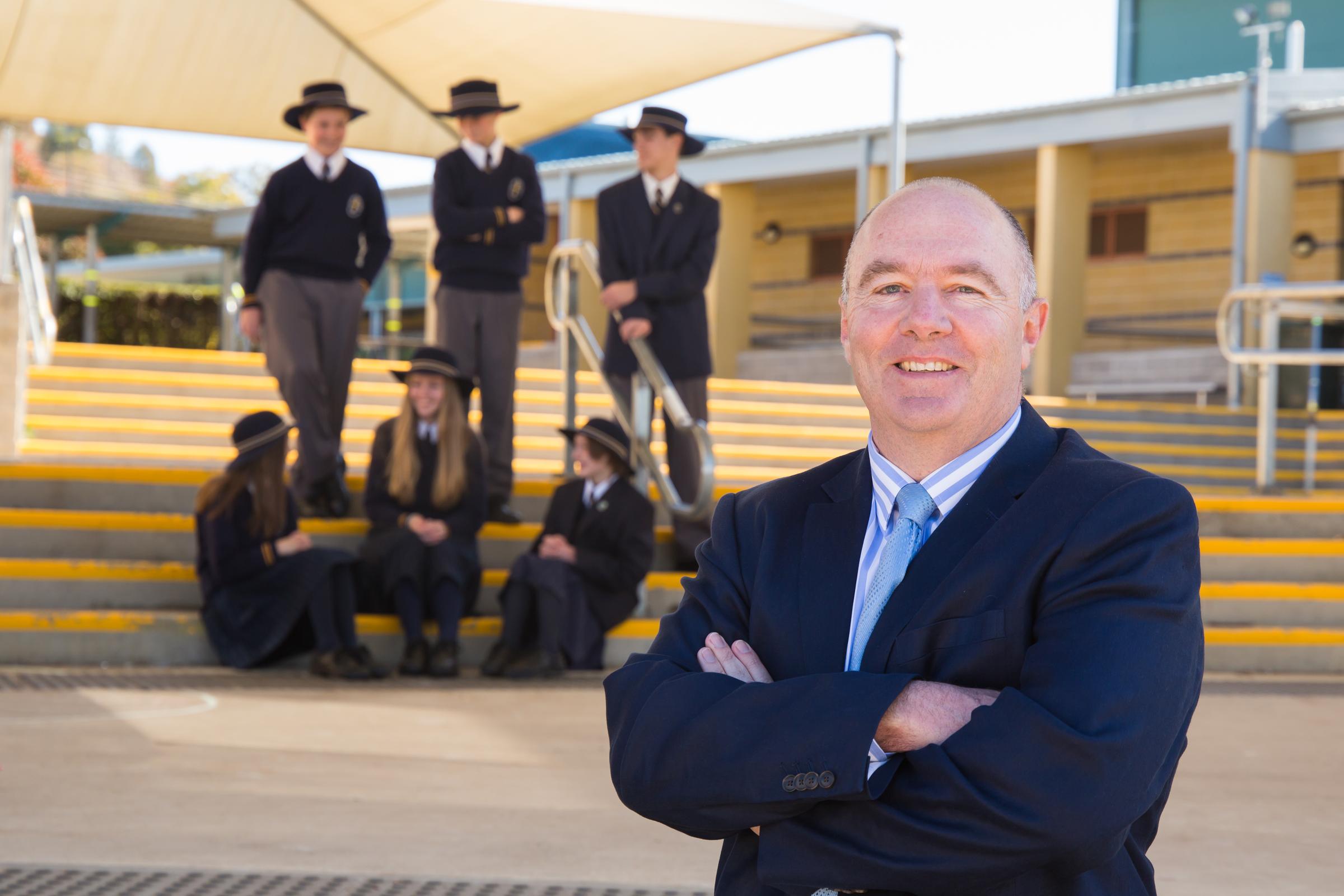Assistant Principal - Pastoral Care

Are Our Children Too Fragile?
I enjoy observing my daughter (who is a primary teacher) parent my two granddaughters. She is quite deliberate and thoughtful in what she says and how she says it to her children. Incidents where they hurt themselves resulting in a child wailing as if the world is about to end is a common one. Amy will calmly ask of her daughters ‘Where does it hurt?’ This, I realised, helps the child to focus on what matters rather than the shock or surprise that they are mostly feeling. Once they focus on the exact problem they are beginning to process and calm down. It is intriguing because the instinct as a parent is to immediately comfort and wrap the child up and make them feel safe again. Amy’s approach helps the child move from an emotional to a logical, rational response and begin to control the situation themselves. It is once this happens that she then comforts and attends to the problem the child is experiencing and discusses how it can be avoided in the future.
The other situation I love watching is when something has gone wrong and my granddaughters are incredibly frustrated or angry but not hurt. Again, using language is important in the situation. Amy helps them to articulate what exactly the problem is and to describe how this makes them feel. From there she begins to ask questions such as ‘What could you do differently? What other options could you take?’ These are then discussed. Sometimes they end up proclaiming that they are just ‘frustrated’ or ‘sad’ and this is fine. Amy will validate their feelings saying ‘I can see how you feel that way’. Sometimes they understand that they need to do something differently the next time. The important thing is that they have worked through the problem and feel more in control. As a parent, Amy tries to empower her daughters rather than solve everything for them.
I was thinking about this because of an article that was in the Sydney Morning Herald: ‘Coddled Children Too Fragile: Expert’ from 27 July, 2019. The article stemmed from a visit but Professor Jonathan Haidt, a social psychologist from New York University who is concerned “about the threat posed not only to children, but to the rest of society by parental over-protection in the middle classes of the English-speaking world”.
He went on to say, “Coddling is the determined effort by adults to deprive kids of feedback from their own experience and replace it with lectures," he told a forum at Sydney University. "'I will tell you what is right and wrong, and you will learn it that way'.
"When you deprive children of [unsupervised] play, you make them vulnerable to anxiety and depression because they fail to develop basic skills of self-regulation and interaction that will make them successful in life.
"In the United States, we know kids need more failure, so we now have college courses on how to fail. They never learn how to fend for themselves."
Some of the consequences of this type of parenting along with the social media malaise is the concerning rise in rates of anxiety and depression and young people struggle to cope with minor challenges in life such as demanding assessment tasks, break ups in friendships or not making a team.
Furthermore, it is impacting on their capacity to cope in the workplace. Some Gen Z employees are challenged by feedback – they begin to “crumble” and their thought processes are typical of someone experiencing depression – “catastrophising, black-and-white thinking, jumping to conclusions.”
Fortunately, I tend to find that living in a rural area many of our students have generally had much more opportunity to explore their physical world unsupervised and have thus learned how to assess risk and tend to be more resilient.
In saying that, there continues to be deep concern regarding social media. If students have unfettered access to the digital world, particularly social media, then the risk taking here can have significant social and emotional consequences. Parents need to be aware and involved in this space with ongoing dialogue between yourself and your young teen about what is appropriate, what is safe and what is ethical and just. The maxim, ‘you cannot put an old head on young shoulders’ is particularly relevant in this context. Technical mastery does not mean a person has the maturity to make wise and sensible decisions.
Building social and emotional resilience is a lifelong project. Parents are pivotal in beginning and shaping the way in which their children respond to set backs and hardships in this world. Allowing young people to fail, to pick up and start again and again and again is what learning is all about.
In an article titled ‘The Five Ways to Build Resiliency’ there are some excellent suggestions on how a parent can support their teenager in building social and emotional resilience:
- Help young people find the positives in situations. In life we are always going to encounter hardships and problems that annoy or frustrate us. Resilient people accept the negatives and move on. Because of built-in survival mechanisms, our brains are naturally wired to pay more attention to negative events than positive ones. But in reality, we experience positive events with much greater frequency. One key to building resiliency, says Barbara Fredrickson (author of Positivity), lies in noticing and appreciating those positive experiences whenever and wherever they occur.“What matters most is your positivity ratio,” she says. That ratio is a product of how you characterize the balance of positive and negative experiences in your daily life. Fredrickson’s research suggests that, at minimum, we need a 3-to-1 ratio of positive to negative experiences not just to build resilience, but also to thrive, be optimally productive and enjoy our lives.”
- Use each experience as a learning opportunity. Help young people to ask questions when they have experienced pain either emotionally or physically – use “question thinking,” a method of problem solving developed by psychotherapist and executive coach Marilee Adams. Question thinking encourages people to approach challenges and situations with “Learner Questions” — neutral, nonjudgmental questions such as “What is useful here?” or “What are my available choices?” — as opposed to “Judger Questions” like “What’s wrong?” or “Who’s to blame?” Learner questions are empowering, and they promote more expansive thinking and acceptance. They also improve how you relate to others, and creating meaningful connections with others is yet another essential component of resilience.
- As I have written about in previous newsletters, acts of kindness to others has a powerful impact on our own sense of self. Acts of kindness, and the serotonin boosts that accompany them, have a cumulative effect. “Once you’ve added these things to your life in a consistent way, the benefits become exponential, so that in times of difficulty you’ve got this well of resiliency to draw upon,” says Sabine. It’s worth noting, though, that receiving and appreciating kindness from others may be just as important as offering it up, because gratitude turns out to be an important part of resiliency, according to clinical social worker Darcy Smith.
- Maintaining good physical health is also critical in supporting a young person to feel in control of their life. It aids sleep and keeps feelings of anxiety at bay.
- Lastly, and I think most importantly, being able to laugh at situations and yourself. “Playful humour enhances survival for many reasons,” writes resiliency authority Al Siebert in The Survivor Personality. For one thing, he notes, “Laughing reduces tension to more moderate levels.” And psychologically, choosing levity can be incredibly empowering. “Playing with a situation makes a person more powerful than sheer determination [does],” Siebert explains. “The person who toys with the situation creates an inner feeling of ‘This is my plaything; I am bigger than it . . . I won’t let it scare me.”
Being fragile at times is part of the human condition, none of us are impervious to pain or hardship but how we respond, how we manage this will determine whether we are crippled by fragility or ultimately, grow from our weakness and become robust and independent adults.
Mr Mick Larkin - Assistant Principal - Pastoral Care



